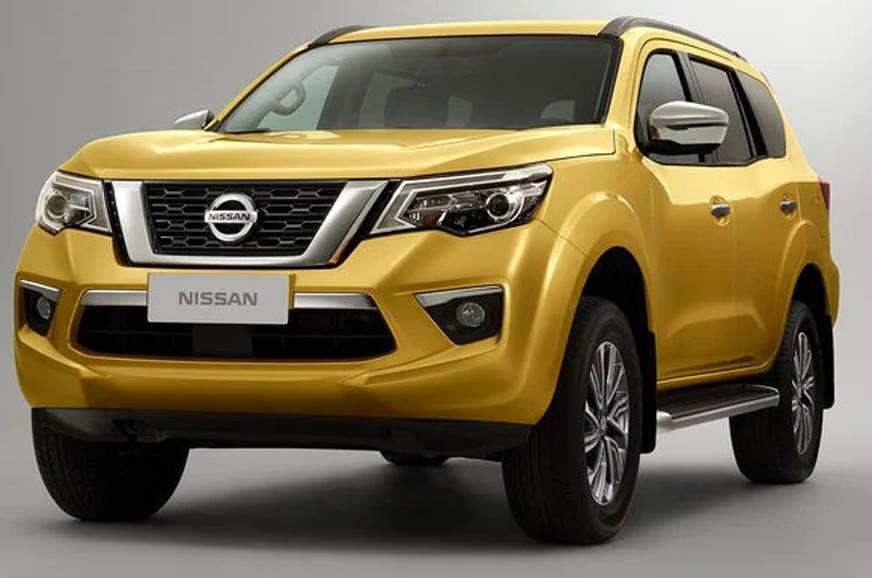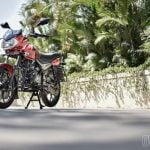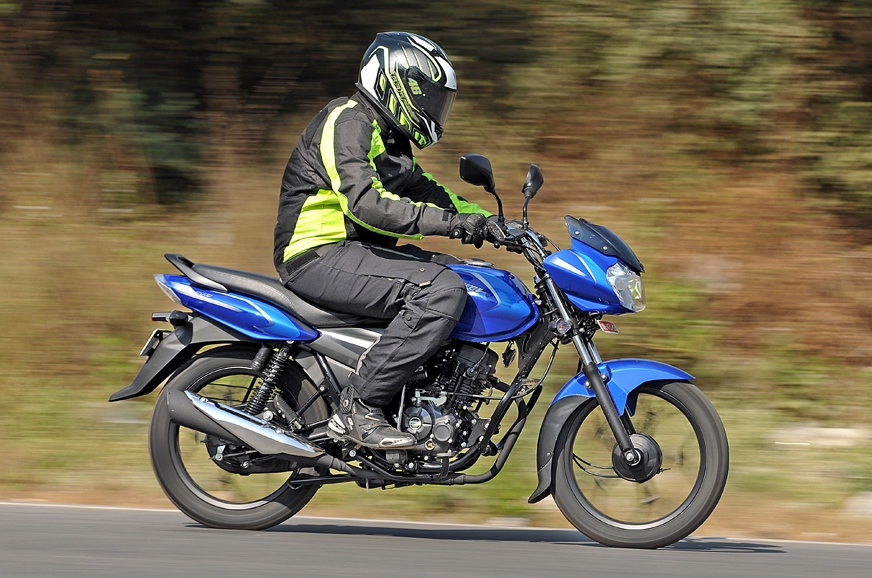
To loosely quote – so as to not plagiarise, mainly – an insightful Bajaj Discover owner I learned about during this ride, the Discover genes are all about having fun on Sunday and being armed to tackle a hectic Monday as well. This is a beautifully coalesced thought (and a simplistic one as well) that can, perhaps, only emerge from an intimate ownership experience. Why is it important for you to know this insight? Because it’s accurate, to begin with.
In its 14-year history, each and every Discover – and there have been over a dozen of them – has aligned itself with this policy. Be it the low-rung 100 or the racy 135 and everything in between, all Discovers have been naturally energetic and yet, suitably sincere towards the task of commuting. To Bajaj’s own admission, not every Discover has been a blockbuster and it has been, surprisingly, the plethora of configurations it has been offered in that has contributed to its dwindling performance on the sales charts. In other words, commuter motorcyclists prefer continuity and a conservative evolution, and with Bajaj offering different bodywork, monoshocks, discs and a varying number of spark plugs, it left the buyer confused. As a result of this learning, Bajaj has called for a concise, streamlined line-up within the Discover family – down to just two models, at the moment – and the second and newest entry in the range is the new Discover 110 you see here.
The Discover has always been a good-looking motorcycle and, 14 years on, it still looks modern if not futuristic. Alright, so it now gets two stacks of LED DRLs integrated neatly into its familiar headlight cowl as well as a new side panel (in a stylish contrasting grey – looks great) but the rest of it harks right back to the original Discover’s styling. The alloys are the same 17-inch units that were introduced on the now-defunct 125S/ST a few years ago and they look cool, even in the understated matte black they’re (along with a few other cycle parts) coated with. The exhaust is a black upswept unit with a chrome heat shield and the neat tail section ends in a tail-lamp with a detailed chrome bezel. Also new is a digi-analogue meter console, which is easily legible and neatly laid out, too, and is separated from the headlight cowl by a layer of foam-ish insulation, to arrest rattles that plastic panels are prone to with age. The only other 110 to offer this is the TVS Victor. The seat has also been re-contoured and re-textured to suit commuting and all of these features are common to the Discover 125 as well, which only gets an optional disc and wider tyres (apart from the larger engine, of course) over the 110.
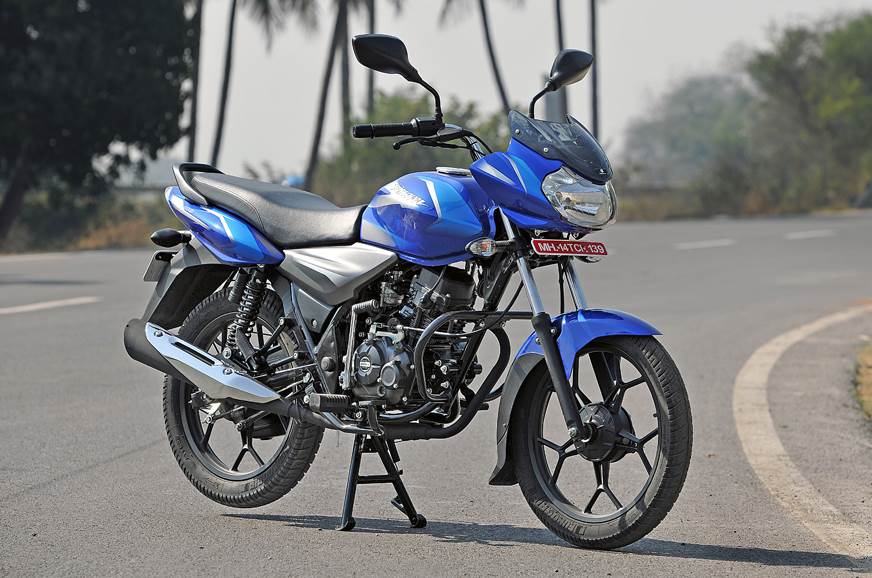
And where does the Discover 110 get its engine from? Not from anywhere else in the Bajaj family, apparently. This is a long-stroke motor (everything in Bajaj’s commuter range is, actually) with a 115.4cc displacement which produces 8.6hp at 7,000rpm and 9.81 Nm of torque at 5,000rpm. It is, as a result, more powerful than anything else in this segment, excepting the TVS Victor 110 (9.4hp at 6,000rpm) but has the highest torque output of all of its competitors. Like everything else in this segment, the 110 has a four-speed gearbox. High on power, higher on torque – aren’t we supposed to be talking commuters right now? Yes, and while these impressive output figures may be a prerequisite of the Discover’s brand identity, Bajaj has wisely balanced this with the long-stroke motor and the (too) low gearing for the benefit of fuel-efficiency and rideability.
Swing a leg over and you find yourself seated in a familiarly compact (if not blatantly cramped) geometry that’s no different to previous Discovers. You do get the sensation of sitting ‘on’ it rather than ‘in’ it and despite the grammatically correct implications of this, it doesn’t translate to the most natural riding stance. Once you get accustomed to it, however, you won’t find it to be an ergonomic challenge. Everything falls within reach comfortably, although I think an even taller handlebar would aid longer hours in the saddle. Thumb the starter and the engine fires up to a refined idle thrum, but revving it (needless as it may be) does introduce you to a noticeable amount of vibrations through the handlebar, seat and pegs; this is standard fare on most bikes in this category, mind you. Snick it into first using the heel-and-toe shifter and it lurches forward with immediacy, and this isn’t standard fare on most bikes in its class, especially the Heros.
The gearbox itself is a fairly positive unit and has a nice mechanical feel to it, though it does feel a bit clunky in comparison to, say, the ‘box on the Honda Dream range. The all-down shift pattern won’t be a bother to those without prior experience with a one-up-rest-down gearbox and, unlike on the new Passion I rode last month, allows for toe-shifting with ease. Moving on, there is little relevance to revving the bearings off this engine (it’s all about the efficiency, isn’t it?) and it is here that the motor’s heightened rideability comes into play. You can short-shift your way up to fourth gear, at as low as 20kph or so, and it’s happy to stay in top gear for the rest of its deliverables. At the 4,000rpm mark, you’re doing a speedo-indicated 50kph, while 60kph comes up at 5,000rpm and 75kph at 6,000rpm – and this is the sweet spot of the 110’s motor. In motion, the aforementioned vibrations come up only past 6,000rpm, which is largely an irrelevant riding-point for the stereotypical commuter. Having said that, it does have the grunt to show you a speedo-indicated top speed in excess of 96kph, which will be an asset for that rare occasion in which your residential colony decides to organise a drag race.
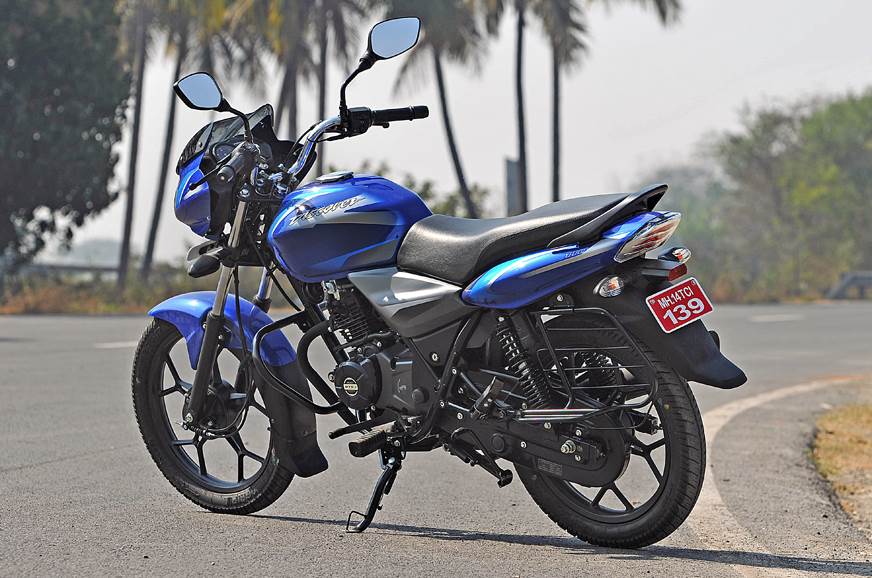
What complements the Discover 110’s compelling engine performance is its dynamics package. Discovers are inherently fun to throw around in corners and the 110 is no different. More importantly, though, the 110 rides particularly well, too, thanks to its telescopic fork (with 140mm of travel) and twin shock absorbers (with piggyback gas reservoirs; 120mm wheel travel). Be it bumps, potholes, absentee tarmac or even those hazardous variations in adjacent layers of tarmac, the 110 takes everything in its stride, all the while exuding commendable stability. Its 118kg kerb weight (the heaviest in its class) does contribute to it, but so does its 1,305mm wheelbase, which is the longest in the segment as well. To summarise, the Discover 110 feels relatively indulgent and always imparts with a solid, rugged feel which has happy implications in both, an urban and rural context.
Not all is perfect about it, however. The first and obvious culprit is the braking. While it’s alright for a budget motorcycle to skimp on a disc, a very good drum brake isn’t a big ask and the 110 doesn’t get one. The front-brake feel is progressive but is too soft to be able to inspire confidence in you, especially under panic-braking situations. You only use the rear brake? Well, firstly, you shouldn’t, but if you persist, you’ll find yourself locking the rear wheel up (under hard braking, of course) which isn’t too impressive, except for bystanders, perhaps. The second let-down – though subjective to a usage pattern – is the eight-litre fuel tank, which effectively gives it a range of 600km or thereabout (going by the ARAI tested 76kpl figure). While this shouldn’t exactly leave you complaining, its competitors offer a much higher range, which may be an incentive for those dismissive of frequent visits to petrol stations. Lastly, the rider’s seat is a bit too narrow for long hours in the saddle, not helped by the compact riding geometry; a wider seat would compensate and have been more comfortable.
So, has Bajaj finally nailed its Discover potion, after 14 years filled with experiments and immense learning? In terms of a sincere, satisfying commuting experience, it certainly has. I haven’t known an entry-level Discover that was this easy to like, particularly in an instant. With the engine’s tractability, the dynamic prowess and an appealing design as its headline acts, I think the Discover 110 is close to being the ideal executive commuter. Its strong appeal is further justified with its Rs 50,176 (ex-showroom, Delhi) price tag, which also helps it undercut each of its rivals. Looks like your Mondays are going to be as fulfilling as your Sundays, then!
[“Source-autocarindia”]



